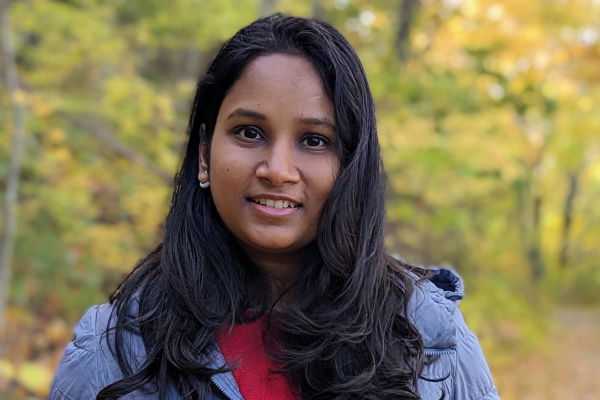
Advice from an alum: balancing work, social life, and self-care after graduation

Navigating social life, self-care, and responsibilities after graduation can often feel overwhelming and challenging. We spoke with M.S. in Data Science graduate Chaitali Harge about her work as a Senior Data Scientist for UVA Health, the obstacles she faced while transitioning from student life to her career, how she avoids burnout, and more after graduating in 2024 from the School of Data Science.
Q: Can you walk us through your career journey since graduating from the School of Data Science?
I was interested in clinical data analysis from the start. Healthcare systems generate enormous amounts of patient data, and I saw real potential to apply data science in ways that could directly improve treatment and outcomes.
After graduation, I joined the Department of Neurosurgery at UVA Health as a data scientist. I’ve been working with high-dimensional time series data from NICU patients with severe brain injuries. Right now, my main focus is developing a predictive model for spreading depolarizations—disruptive waves of brain activity that can worsen outcomes.
The data is complex and often noisy, which makes it both challenging and rewarding. I’ve had to learn a lot about the clinical side while also experimenting with new analysis techniques and tools. I see this role as an ongoing learning opportunity—every dataset, every problem pushes me to think differently and get better at translating raw data into something clinically meaningful.

Q: What were the biggest challenges you faced transitioning from student life to the working world, and how did you manage them?
One of the biggest challenges was realizing how messy real-world data actually is. The datasets I work with are raw, high-volume, and often inconsistent. Cleaning and preprocessing the data takes a lot of time and careful coding. Sometimes a small error can cost hours, just to get the data into a usable format.
Another major challenge is missing data. In clinical research, especially in longitudinal studies where patients are followed over time, missingness is common. But it’s rarely truly random, which makes standard imputation techniques unreliable. Ethical and practical constraints also limit what we can assume or fill in. Dealing with this requires a deep understanding of the clinical context, close collaboration with neurosurgeons, and a cautious approach to interpreting patterns.
To manage these challenges, I rely on continuous learning—through study materials, research papers, and online resources. The M.S. in Data Science program gave me the foundation to approach problems independently, find the right tools when I need them, and keep moving forward without getting stuck. That mindset has been essential in working with real-world clinical data.
Q: Do you have any personal routines or habits that help you maintain balance and avoid burnout such as time blocking, exercise, or digital detox?
I try to maintain a good work-life balance by staying engaged in things outside of data and screens. I love traveling, so I’m always on the lookout for weekend getaways. I spend a lot of time hiking, camping, and making the most of summer outdoors. I’m also an avid reader, which helps me fully disconnect from the constant stream of AI updates, tech newsletters, and coding frustrations.
Digital detox is tough, especially in this field, but I do make an effort to cut down on phone use. Activities like cooking, cycling, or just going for a walk help me reset and keep my energy up.
Q: What has helped you build friendships outside or inside of your job, especially in a new environment?
Moving to a new environment, I’ve found that shared interests make it easier to build real connections. Group hiking activities have been a great way to meet people with similar energy, outdoorsy, curious, and easy to talk to. I’ve also met a few people through UVA’s workshops and events, which helped create a sense of continuity after graduation. At work, friendships have developed naturally through collaboration and shared challenges.
I’ve learned that showing up, whether it’s to a trail, a seminar, or just lunch with coworkers, goes a long way toward making meaningful connections.
Q: Looking back, is there anything you wish you'd known about work-life balance when you were starting out?
To be honest, I’ve had a good work-life balance from the start. If anything, I’ve realized that balance isn’t about strict rules or perfect routines. It’s about knowing when to unplug and being intentional with your time outside of work.
I didn’t need to learn that the hard way, but it’s easy to underestimate how crucial balance is until you’re deep in a project or stuck on a screen for too long. Starting early to pace yourself and setting boundaries around your time can make all the difference even when everything feels exciting and new.
Q: What is one piece of advice you would give to our recent graduates?
One piece of advice I’d give is to be patient with messy data and with yourself. Real-world datasets aren’t clean, and your code won’t always be perfect, which is okay. Trial and error is part of the process. Most progress happens through iteration, debugging, and testing new approaches.
That same patience applies to growth. To keep yourself updated, a habit of keeping up with the field by reading data science newsletters, tech blogs, and tracking new tools and methods is really important. Things evolve fast, and staying curious is the only way to keep pace without feeling overwhelmed.
Also, step away from the screen sometimes. I’ve found that hiking, reading books, or just doing something offline helps reset my mind.




